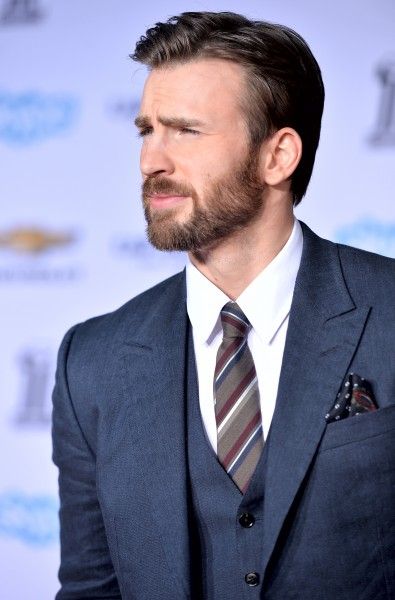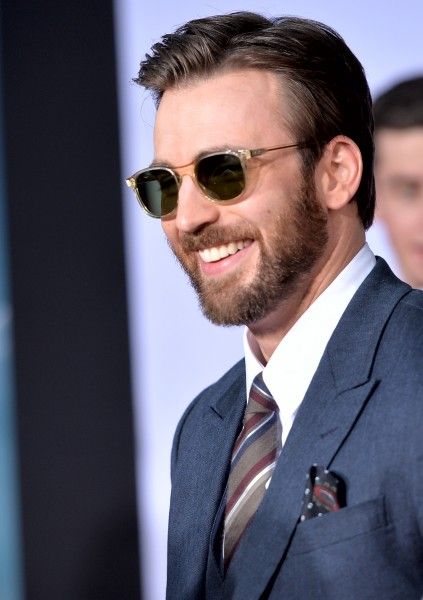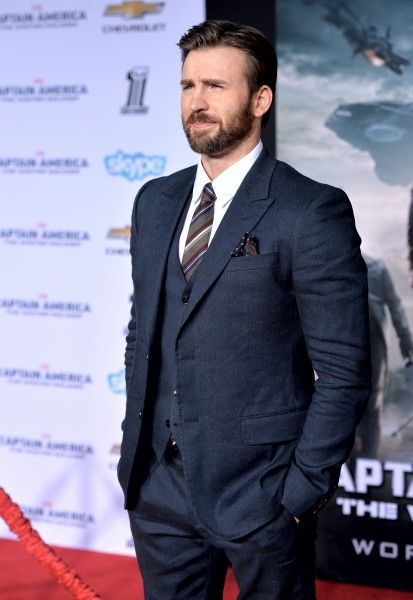While Chris Evans is known for his work in front of the camera, in the near future we're going to be able to see what he can do behind the camera. Late last year, Evans directed his first movie, 1:30 Train, and he's currently in post-production finishing it up. The indie pic is about two people (played by Evans and Alice Eve) who meet in a train station and share a night of romantic adventures before the woman must catch the next train back to New York.
The day after I spoke to Evans about Captain America: The Winter Solider (watch that interview here), I landed a bit of time to talk about his directorial debut. He talked about filming in New York City, where he's at in the editing process, test screenings, how he initially envisioned using only a soundtrack but changed his mind and decided to use a score, if he should try and premiere the film at the Sundance Film Festival or the Toronto International Film Festival, how he wants to direct his next film this August (after Avengers: Age of Ultron wraps), and what kinds of projects he wants to focus on. Hit the jump for what he had to say.
Collider: Talk to me about getting behind the camera. I've asked you the Captain America questions, I want to focus on the directorial debut. Was it a challenging shoot? You we're in New York city.
CHRIS EVANS: Yes, was it a challenging shoot? It was a challenging shoot. I'll tell you, the only issue is because it's New York at night. First of all, listen, I love shooting in the city. The city is a character in my opinion, it really is, but New Yorkers are not that enthusiastic when you shut down their streets [laughs] and they're not exactly accommodating. So it was a challenging environment, it was freezing and it's all night shoots, so by the end of the first week you just got a lot of people who are just catatonic and tired, so you kind of have to maintain a certain mentality. The fish rots from the head down, so if you come to set complaining and bitching, everyone's going to start, so you try and come in every day with the most positive attitude you can. That’s a set when I needed Anthony Mackie. That’s a set where you need the energy that Mackie can provide.
Where you are in the editing process now?
EVANS: We got through the first edit. We've done our first cut and now it’s a matter of spit polishing, you do these screenings and you read the test results and it’s a challenge. The problem is when you've seen the movie so many times- I know every single take, I know every single cut, I know every single daily, it’s hard to detach yourself a little bit. We're about to go on this press tour. I leave Saturday and then I'll be gone about two and a half weeks, and during that time I am just not even going to think about 1:30 Train. Hopefully I can come back with some fresh eyes and have a pretty clear perspective on what's working and what's not.
I've spoken to a lot of filmmakers who do the test screening and they actually enjoy it because things that they think are working maybe don’t work.
EVANS: [Laughs] Yeah, I'm sure we had plenty of those. We also had some things that you think won't work that do. There's no rhyme or reason for these test screenings, I tell you. You read these comment cards and things you really thought were great are a miss and things that you really thought were going to be problem areas actually work out. This is where it becomes a bit of a balance, because you want to make sure you listen to these test audiences, because you want to sell tickets, but by the same token it's not like a painter does a painting and then asks everyone, "Do I need more purple?" There has to be a part of you that makes a creative decision to say, "This is what I want." The problem is that when it comes to painting a picture, the canvas and paintbrush don’t cost millions of dollars that someone else funded. So as a result a lot of people have opinions and a lot of people are allowed to have their say. This is where making art becomes tricky.
Where are you in terms of the soundtrack and music you want to use?
EVANS: Our music is still temp, we haven't hired a composer yet. And it's so funny, when I initially set out to make the movie I really thought I only wanted a soundtrack. I really only wanted songs. I had all these songs in my head that I wanted to use, but what I found is that when you drop a lot of these songs into the scenes, it almost felt like TV. It felt juvenile in a way. I ended up realizing score is far more effective. Score makes things a little more poetic, a little more artistic. The second you drop a song into it, it feels like- I don’t want to name a TV show, but all the sudden it just feels not as artistic as you'd like it to sound. You watch a movie like Place Beyond the Pines, you'd be hard-pressed to find a song in that movie. It's all score.
Derek Cianfrance is amazing.
EVANS: The guy's unbelievable, but it's score. You don’t even notice it. You notice soundtrack, you don’t notice score. That’s the point, score is just supposed to emphasize the moments. It's supposed to highlight what the camera's doing. So I've kind of realized that score is my friend.
We are in March, the Toronto film festival is September, Sundance is January.
EVANS: Which one? This is where- I'm embarrassed to admit in my whole career, film festivals are not the thing that I've focused on and it's so funny sitting with my producers. We're like, "Where do we want to go? Where do you want to go?" And they all have their opinions and in my brain I'm like, "Well, what's the difference?" Apparently there's a big difference.
There's a big difference.
EVANS: There's a big difference! I didn’t know that. To me- hey, wherever we want to go is fine by me. It's the first movie, there are unforeseen challenges and I'm learning an enormous amount. It's kind of the thing where you just kind of can't wait to get to the next movie. The second I finish Avengers I can't wait to start the next one in August, which I have every intention of doing.
I know I have to wrap with you, but I have two things. One, I would suggest for you Sundance, based on all the knowledge that I have on film festivals. I think it's more of a personal filmmaker- Toronto is so under the water of award season and that's what everyone's talking about that sometimes smaller movies lose focus.
EVANS: Toronto is more based on awards and things like that?
I think for a first time filmmaker and a personal movie, I would say Sundance is better. I haven't seen your film so I don't know, but in my own opinion would be Sundance because it's a welcoming place for first time filmmakers and that's where I would go if I had a first time movie. You seem very passionate about being a director and I'm definitely curious about- you mentioned August, what books or stories have you been looking at?
EVANS: This is the crazy thing, my team is like, "What do you want to do next? What type of movie do you want to do?" For me, I like human stuff. I like stories that are like- unfortunately they may be interpreted as simple, and I hate putting them in that category, but I like things that feel relatable. I like stories about brothers and sisters, fathers and sons, mothers, daughters, boyfriends, girlfriends. Human stories, like Terms of Endearment. Ordinary People. Just dramas- drama, but things that are just relatable. Things that aren't too fantastical. It doesn't have to be about wild drug dealers and car chases and bank robberies. Just simple stories that can resonate on a profound level.
So you basically are thinking August you're going to do another movie, but you just haven't decided which one yet.
EVANS: I will do another movie in August and I just don't know what it is yet.
So you have a few scripts that you're debating.
EVANS: Yeah, I got a couple that I'm reading and I told my team just send me everything. Because I've got the whole movie of Avengers, I'm literally going to London and I'm just going to be reading scripts. I'm going to find something else and I'm going to do it.




